|
Books Should Be Free Loyal Books Free Public Domain Audiobooks & eBook Downloads |
|
|
Books Should Be Free Loyal Books Free Public Domain Audiobooks & eBook Downloads |
|
Fantasy Books |
|---|
|
Book type:
Sort by:
View by:
|
By: L. Frank Baum (1856-1919) | |
|---|---|
 The Master Key
The Master Key
The Master Key was one of Baum’s earliest full length fantasy books for children, published in 1901 just one year after The Wonderful Wizard of Oz. The protagonist, Rob, while experimenting in his workshop, accidentally summons up an electrical fairy who presents him with electrical devices so advanced as to seem magical. His gifts include a flying contraption, a stun gun, and something resembling an omniscient portable TV set. Rob travels the world, rendering assistance to European heads of state and narrowly escaping disaster at the hands of “primitive” cannibals, Turks and Tatars, pirates, and evil scientists who try to steal his inventions... | |
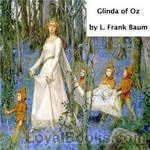 Glinda of Oz
Glinda of Oz
Glinda of Oz is the fourteenth Land of Oz book and is the last one written by the original author L. Frank Baum, although the series was continued after his death by several other authors. Dorothy and Ozma discover that a war is brewing in a distant and unexplored part of Oz, between two mysterious races, the Flatheads and the Skeezers. The girls set out to try to prevent the fighting, not knowing what dangers await them. | |
 The Magic of Oz
The Magic of Oz
L. Frank Baum’s last beloved Oz book before his death, this story deals with the discovery of a powerful magic word by a young boy from Oz, who immediately is plunged head-first into adventure through his discovery. | |
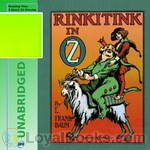 Rinkitink in Oz
Rinkitink in Oz
Rinkitink in Oz is the tenth book in the Oz series written by L. Frank Baum, first published in 1916. It was originally written in 1905 as a stand alone fantasy work and subequently rewritten as an Oz book. Therefore, most of the action takes place outside of Oz in neighboring fairy countries. It tells the story of Prince Inga’s quest to rescue his parents from captivity after his island home is ravaged by enemies. With the help of three magical pearls and the more dubious assistance of the excessively... | |
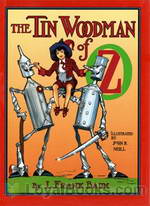 The Tin Woodman of Oz
The Tin Woodman of Oz
The Tin Woodman of Oz is the twelfth Land of Oz book written by L. Frank Baum and was originally published on May 13, 1918. The Tin Woodman is unexpectedly reunited with his Munchkin sweetheart Nimmie Amee from the days when he was flesh and blood. This was a backstory from The Wizard of Oz. | |
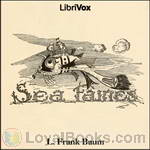 The Sea Fairies
The Sea Fairies
In 1910, Baum hoped to end the Oz series and follow with a new series about a little girl named Trot and her sailor companion, Cap’n Bill. The Sea Fairies (1911) was the first book in the projected series and took Trot and Cap’n Bill under the sea where they had adventures with mermaids and other fantastic creatures. It was followed by Sky Island (1912) and then Baum returned to the Oz titles. He brought Trot and Cap’n Bill to Oz in the Scarecrow of Oz (1915). | |
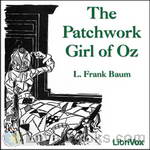 The Patchwork Girl of Oz
The Patchwork Girl of Oz
An unlucky Munchkin boy named Ojo must travel around Oz gathering the ingredients for an antidote to the Liquid of Petrifaction which has turned his beloved uncle Unc Nunkie and the wife of the Liquid's creator into marble statues. Ojo is joined by the patchwork girl Scraps, Dorothy, Dr. Pipt's Glass Cat, the Woozy, the Shaggy Man, the Scarecrow and the Tin Woodman. They eventually visit the Emerald City to ask for help from the Wizard of Oz. | |
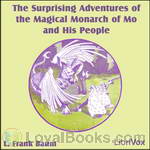 The Surprising Adventures of the Magical Monarch of Mo and His People
The Surprising Adventures of the Magical Monarch of Mo and His People
The Magical Monarch of Mo is a set of stories about the titular king, his queen, and his royal children. The stories are uproariously funny, dealing with topics as absurd as a man losing his temper who then tries to find it, an evil midget who steals a princess's big toe, and an entire city filled with highly civilized monkeys! Join the Monarch and all his friends for a rollicking adventure, filled with fun for the whole family! | |
 The Woggle-Bug Book
The Woggle-Bug Book
| |
 Policeman Bluejay
Policeman Bluejay
This is another "TWINKLE TALE" from Mr. Baum (written under the pen name Laura Bancroft) and celebrates the further adventures of Twinkle and Chubbins as they magically become child-larks and live the exciting, and often dangerous, life of birds in the forest. | |
By: Leigh Brackett (1915-1978) | |
|---|---|
 Black Amazon of Mars
Black Amazon of Mars
Carrying out the last wishes of a comrade, mercenary Eric John Stark takes on the task of returning a stolen talisman to a walled city near the Martian pole; a city that guards the mysterious Gates of Death. Now all he has to do is get past the brutal clans of Mekh and the shadowy Lord Ciaran to get to Kushat where they’ll probably attempt to kill him. All while he tries to hold on to a talisman that imprints ancient memories of the Gates in his mind. That’s not easy for a human raised by Mercurian aborigines... | |
By: Leigh Douglass Brackett (1915-1978) | |
|---|---|
 Lorelei of the Red Mist
Lorelei of the Red Mist
Ray Starke, a small time criminal, crashes his shuttle while trying to escape pursuit after robbing a payroll worth millions of credits. When he comes to there is an alien woman telling him he's dying but she will put his consciousness in another body and help him escape using telepathy. - Summary by kirk202 | |
 Three Science Fiction Novellas by Leigh Brackett
Three Science Fiction Novellas by Leigh Brackett
ENCHANTRESS OF VENUS: Laughing, she cast him down into the hideous depths, beneath the seas of flaming gas, to where dead blossoms swayed, whispering, over strangely jumbled ruins.... But there he found the secret of her power, and came surging back—up from the depths, up from the seas, the tortured swamps—to storm her forbidding shrine and seek her within, death like a gift in his hands. SHANNACH—THE LAST: Even in this grip of alien horror a man could not throw away his lifetime goal ... | |
By: Lewis Carroll (1832-1898) | |
|---|---|
 Alice's Adventures in Wonderland
Alice's Adventures in Wonderland
An acclaimed children’s classic depicting the odd, but riveting journeys of the curious Alice as she explores the surreal world of Wonderland. Written by Charles Lutwidge Dodgson or better known under his pseudonym Lewis Caroll, this episodic novel is assembled in twelve chapters each containing a prominent adventure. The departure from logic and its embracement of pure imagination is what makes Alice’s Adventures in Wonderland a model for fantasy novels and a timeless classic. The novel begins when the self-aware young Alice, who grows bored of sitting by the river with her sister, and spots a peculiar looking rabbit, dressed in a waistcoat... | |
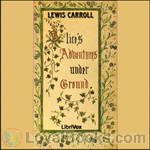 Alice's Adventures Underground
Alice's Adventures Underground
This is the handwritten book that Carroll wrote for private use before being urged to develop it later into Alice in Wonderland. It was generously illustrated by Carroll and meant to entertain his family and friends. When a sick child in a hospital enjoyed it so much, the mother wrote him saying it had distracted her for a bit from her pain and led eventually to Carroll expanding the story. The Reverend Charles Lutwidge Dodgson and the Reverend Robinson Duckworth rowed in a boat, on 4 July 1862,[12]... | |
By: Lily Dougall (1858-1923) | |
|---|---|
 Mermaid
Mermaid
"'What a fool I was not to go where she beckoned!' mused Caius. 'Where? Anywhere into the heart of the ocean, out of this dull, sordid life into the land of dreams.' For it must all have been a dream—a sweet, fantastic dream, imposed upon his senses by some influence, outward or inward; but it seemed to him that at the hour when he seemed to see the maid it might have been given him to enter the world of dreams, and go on in some existence which was a truer reality than the one in which he now was... | |
By: Lord Dunsany (1878-1957) | |
|---|---|
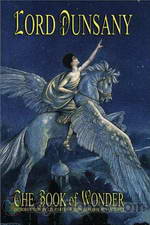 The Book of Wonder
The Book of Wonder
“Come with me, ladies and gentlemen who are in any wise weary of London: come with me: and those that tire at all of the world we know: for we have new worlds here.” – Lord Dunsany, the preface to “The Book of Wonder” | |
 Time and the Gods
Time and the Gods
Lord Dunsany (24 July 1878 – 25 October 1957) was a London-born Anglo-Irish writer and dramatist notable for his work in fantasy. He was influenced by Algernon Swinburne, who wrote the line “Time and the Gods are at strife” in his 1866 poem “Hymn to Proserpine”, as well as by the fairy tales of the Brothers Grimm and Hans Christian Andersen. In turn, Dunsany’s influence was felt by H. P. Lovecraft and Ursula K. Le Guin. Arthur C. Clarke corresponded with Dunsany between 1944 and 1956. Those letters are collected in the book Arthur C. Clarke & Lord Dunsany: A Correspondence. Time and the Gods, a series of short stories written in a myth-like style, was first published in 1906. | |
 Fifty-One Tales
Fifty-One Tales
Very brief, well-crafted stories, many having surprise endings, all steeped in the dye of myth and calling to every reader's neglected imagination. | |
By: Lord Dunsany (1878-1957) | |
|---|---|
 Gods of Pegāna
Gods of Pegāna
"The Gods of Pegāna" is the first book by Anglo-Irish fantasy writer Lord Dunsany, published on a commission basis in 1905... The book is a series of short stories linked by Dunsany's invented pantheon of deities who dwell in Pegāna. It was followed by a further collection "Time and the Gods" and by some stories in "The Sword of Welleran and Other Stories". | |
 Dreamer's Tales
Dreamer's Tales
"A Dreamer's Tales" is the fifth book by Irish fantasy writer Lord Dunsany, considered a major influence on the work of H. P. Lovecraft, J. R. R. Tolkien, Ursula K. Le Guin, Michael Moorcock and others. "A Dreamer's Tales" is a collection of sixteen fantasy short stories, and varies from the wistfulness of "Blagdaross" to the horrors of "Poor Old Bill" and "Where the Tides Ebb and Flow" to the social satire of "The Day of the Poll." (text from Wikipedia articles on Lord Dunsany and "A Dreamer's Tales") | |
 Don Rodriguez: Chronicles of Shadow Valley
Don Rodriguez: Chronicles of Shadow Valley
| |
By: Louis Dodge (1870-1952) | |
|---|---|
 Everychild A Story Which The Old May Interpret to the Young and Which the Young May Interpret to the Old
Everychild A Story Which The Old May Interpret to the Young and Which the Young May Interpret to the Old
| |
By: Louisa May Alcott (1832-1888) | |
|---|---|
 The Candy Country
The Candy Country
| |
By: Lucian of Samosata (120—180) | |
|---|---|
 Trips to the Moon
Trips to the Moon
The endeavour of small Greek historians to add interest to their work by magnifying the exploits of their countrymen, and piling wonder upon wonder, Lucian first condemned in his Instructions for Writing History, and then caricatured in his True History, wherein is contained the account of a trip to the moon, a piece which must have been enjoyed by Rabelais, which suggested to Cyrano de Bergerac his Voyages to the Moon and to the Sun, and insensibly contributed, perhaps, directly or through Bergerac, to the conception of Gulliver’s Travels. The Icaro-Menippus Dialogue describes another trip to the moon, though its satire is more especially directed against the philosophers. | |
By: Manly Wade Wellman (1903-1986) | |
|---|---|
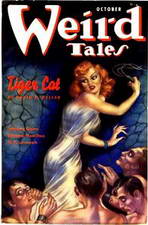 The Golgotha Dancers
The Golgotha Dancers
| |
By: Marie Corelli (1855-1924) | |
|---|---|
 A Romance of Two Worlds
A Romance of Two Worlds
A Romance of Two Worlds starts with a young heroine telling her story of a debilitating illness that includes depression and thoughts of suicide. Her doctor is unable to help her and sends her off on a holiday where she meets a mystical character by the name of Raffello Cellini, a famous Italian artist. Cellini offers her a strange potion which immediately puts her into a tranquil slumber, in which she experiences divine visions. | |
By: Marion Zimmer Bradley (1930-1999) | |
|---|---|
 Falcons of Narabedla
Falcons of Narabedla
Somewhere on the Time Ellipse, Mike Kenscott became Adric of the Scarlet Tower, and the only way to return to his own identity was to find the Keep of the Dreamer, and loose the terrible Falcons of Narabedla. A classic novella by master science fiction writer Marion Zimmer Bradley, originally published in Other Worlds magazine in 1957. - Summary by Mark Nelson | |
By: Mary Louisa Molesworth (1839-1921) | |
|---|---|
 The Palace in the Garden
The Palace in the Garden
The Palace in the Garden is the engaging story of three orphans sent to live in the mysterious country cottage of Rosebuds. The inquisitive children piece together the unexpected mystery of the Palace in the garden & all that goes with it. The story has a few twists. This book put me in mind of the Secret Garden.(Introduction by ilianthe) | |
By: Maude L. Radford (1875-1934) | |
|---|---|
 King Arthur and His Knights
King Arthur and His Knights
Published in 1903, King Arthur and His Knights by Maude L. Radford is an easy to read version of the Arthurian legends, made simple and interesting for children. Maude Lavinia Radford Warren was a Canadian born American who taught literature and composition at the University of Chicago between 1893-1907. Following the success of some of her books, she left teaching to take up writing as a full time career. She also served as a war correspondent for the New York Times magazine during WWI and contributed several remarkable features on the role of women in the conflict... | |
By: May Agnes Fleming (1840-1880) | |
|---|---|
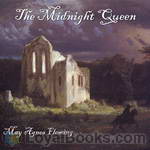 The Midnight Queen
The Midnight Queen
May Agnes Fleming is renowned as Canada's first best-selling novelist. She wrote 42 novels, many of which have only been published posthumely.The Midnight Queen is set in London, in the year of the plague 1665. Sir Norman Kingsley visits the soothsayer "La Masque" who shows him the vision of a beautiful young lady. Falling madly in love with her, he is astonished to find her only a short time later and saves her from being buried alive. He takes her home to care for her, but while he fetches a doctor, she disappears. Sir Kingsley and his friend Ormistan embark on an adventure to solve the mystery of the young lady - will they ever find her again? | |
By: Montague R. James (1862-1936) | |
|---|---|
 The Five Jars
The Five Jars
The Five Jars is the only novel written by James, who is best known for his ghost stories. It is a peculiarly surreal fantasy apparently written for children. While he is out walking, the narrator is drawn to a remote pool, and finds a small box that has been hidden since Roman times. He gradually learns how to use its contents, fighting off a series of attempts to steal it, and becomes aware of a strange world hidden from our own. | |